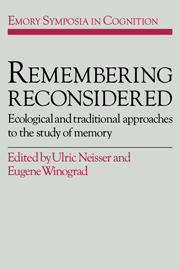Book contents
- Frontmatter
- Contents
- Preface
- List of contributors
- 1 New vistas in the study of memory
- 2 Continuities between ecological and laboratory approaches to memory
- 3 Memory for randomly sampled autobiographical events
- 4 Ordinary everyday memories: Some of the things of which selves are made
- 5 Walking in our own footsteps: Autobiographical memory and reconstruction
- 6 Memory observed and memory unobserved
- 7 The maintenance of marginal knowledge
- 8 The content and organization of autobiographical memories
- 9 The ontogeny of memory for real events
- 10 The functions of event memory: Some comments on Nelson and Barsalou
- 11 “The Wreck of the Old 97”: A real event remembered in song
- 12 Passive remembering
- 13 Remembering without experiencing: Memory for reported events
- 14 What is ordinary memory the memory of?
- 15 Go for the skill
- Name index
- Subject index
6 - Memory observed and memory unobserved
Published online by Cambridge University Press: 25 March 2010
- Frontmatter
- Contents
- Preface
- List of contributors
- 1 New vistas in the study of memory
- 2 Continuities between ecological and laboratory approaches to memory
- 3 Memory for randomly sampled autobiographical events
- 4 Ordinary everyday memories: Some of the things of which selves are made
- 5 Walking in our own footsteps: Autobiographical memory and reconstruction
- 6 Memory observed and memory unobserved
- 7 The maintenance of marginal knowledge
- 8 The content and organization of autobiographical memories
- 9 The ontogeny of memory for real events
- 10 The functions of event memory: Some comments on Nelson and Barsalou
- 11 “The Wreck of the Old 97”: A real event remembered in song
- 12 Passive remembering
- 13 Remembering without experiencing: Memory for reported events
- 14 What is ordinary memory the memory of?
- 15 Go for the skill
- Name index
- Subject index
Summary
In his book Memory Observed (1982), Neisser claimed that almost all interesting questions about memory have been ignored by experimental psychologists. The conference that is documented by this book was meant to help remedy this situation by launching an ecological approach to memory research. Contributors were invited to attend the conference because their research was considered ecologically valid. When I received my invitation, I viewed this with some misgivings, because I identify with the “establishment” memory researchers who apparently have done uninteresting work. Also, my research addresses different issues and, perhaps, is less clearly ecologically valid than is the research other contributors are reporting here. However, I gained some comfort by noting at least a superficial similarity between the ecological approach to memory research and the approach advocated by functionalists such as Dewey (1910). The approaches agree in their claim that the functions of memory must be viewed as allowing adaptation of an organism to its environment and in their preference for talking in terms of processes or mental operations rather than in terms of mental structures. Most of the research of the early functionalists would seem to meet Neisser's criteria for ecological validity, although they conducted their research in the laboratory as well as in natural contexts. The advantage that I gain by noting these similarities is that the functionalists provide an excellent example of the coordination of laboratory research and ecological concerns.
Information
- Type
- Chapter
- Information
- Remembering ReconsideredEcological and Traditional Approaches to the Study of Memory, pp. 145 - 177Publisher: Cambridge University PressPrint publication year: 1988
Accessibility standard: Unknown
Why this information is here
This section outlines the accessibility features of this content - including support for screen readers, full keyboard navigation and high-contrast display options. This may not be relevant for you.Accessibility Information
- 18
- Cited by
